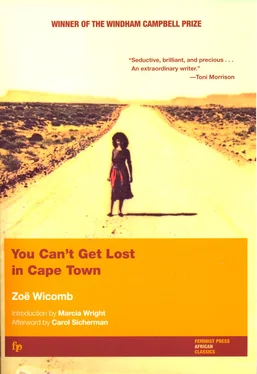Moira laughs. ‘You’re always ready with a mouthful of words. I’m surprised that you have any trouble with knocking off an essay.’
As we go off towards the Arts block we watch the gardeners in their brown overalls putting out hundreds of chairs in the square to accommodate all the students and staff. The chairs are squashed between the flowerboxes where the spring-green of foliage just peeps over the concrete. I try to think what they are but cannot imagine flowers tumbling over that concrete rim now lashed by the shadow of the wind-tossed flag.
Later I lean against the brick wall at the back of the cafeteria, my knees drawn up and the folder resting on the plane of my thighs. The soil is somewhat damp but I do not mind since a luke-warm sun has travelled round to this wall. Besides, there is nowhere else to go; the library as well as the cafeteria is shut and I wouldn’t like to sit in the deserted Arts block.
A heavy silence hangs over the campus. The bush is still as if the birds are paying their respects to the dead Verwoerd. This freshly rinsed light won’t last; such a stillness can only precede the enervating sweep of the south-easterly wind. I watch an ant wriggle her thorax along a blade of grass before I turn to my watch to find that the minute arm has raced ahead. The ceremony will start in fifteen minutes. It will probably last an hour and before that my essay must be finished and delivered. I read Retief’s notes and start afresh. This will have to be my final copy since there is no time to develop ideas, let alone rephrase clumsy language. My attempt to understand the morality of the novel has to be abandoned. Retief will get what he wants, a reworking of his notes, and I will earn a mark qualifying for the examination.
It is not easy to work in this eerie silence. The stillness of the trees, the dark bush ahead inspire an unknown fear, a terror as if my own eyes, dark and bold as a squirrel’s, stare at me from the bush. I am alone. The lecturers settling into their mourning seats under the flag some three hundred yards away offer no reassurance. If only a bird would scream or an animal rush across the red carpet of Rooikrans pods along the fringe of the bush, this agitation would settle. When the tall Australian bluegums shiver in the first stir of air, I retrieve my restless fingers raking through the grass to attend to Tess, luscious-lipped Tess, branded guilty and betrayed once more on this page. Time’s pincers tighten round my fingers as I press on. This essay, however short and imperfect, must be done before three o’clock.
I start at the sound of gravel crunched underfoot. Surely there is no one left. Students in the hostel would keep to their rooms; others have rushed off for the 1.30 bus, too anxious to hitch the customary lift to the residential areas. I get up cautiously, tiptoe to the edge of the wall and peer round to see a few young men in their Sunday suits filing from the Theology College towards the square. They walk in silence, their chins lifted in a militaristic display of courage. I have no doubt that they have been asked to support the boycott. But they will think their defiance heroic and stifle the unease by marching soldier-like to mourn the Prime Minister.
Their measured tread marks the short minutes that go on sounding long after they have disappeared. I scribble wildly these words that trip each other up so that the page is defaced by inches of crossed-out writing and full stops swelled by a refractory pen that shrinks before a new sentence. Just as I finish, the gilt braid of fleece overhead slips under cover of a brooding raincloud. There is no time to make a fair copy. It is nearly three o’clock and I do not have the courage to wait for a bus or a lift at the main entrance where tall, fleshy cacti with grotesque limbs mock the human form. With difficulty I slip the essay without an explanatory note under Retief’s close-fitting door then brace myself for the bush, for I must find the path that leads to the little station and wait for the Cape Flats train.
Tamieta shifts in her seat and lifts her wrist to check again the ticking of her watch. If this thing should let her down, should wilfully speed up the day so that she is left running about like a headless chicken amongst her pots. But she allows her wrist to drop in her lap; the unthinkable cannot be developed any further. And yet she has just fallen breathless in her chair, the first in the last row, only to find no one here. Not a soul. All the chairs in front of her are empty, except for the first two rows where the Boers sit in silence. Only two of the lecturers are women who, in their black wide-rimmed hats, are curious shapes in the distance.
Tamieta had no idea that the ceremony was for white people only. Oh, what should she do, and the shame of it flames in her chest. Wait until she is told to leave? Or pick up the bag of working clothes she has just tucked under her chair and stagger off? But a few heads had turned as she sat down; she has already been seen, and besides how can she trust these legs now that her knees are calcified with shame and fear? She longs for a catastrophe, an act of justice, something divine and unimaginable, for she cannot conceive of a flood or a zigzag of lightning that will have her tumbling in scuffed shoes with her smoking handbag somersaulting over or entwined with the people at the front. There is no decent image of a credible demise to be summoned in the company of these mourners, so she fishes instead in her handbag for the handkerchief soaked in reviving scent. Californian Poppy, the bottle says, a sample that Beatrice had written away for and which arrived in the post with the picture on the label hardly discernible as a flower, just a red splodge, and as she inhales the soothing fragrance her mind clears into a sharp memory of the supervisor. Mr Grats said distinctly as he checked the last consignment of plates, ‘Tomorrow is the ceremony, so close up straight after lunch. It won’t last more than an hour so you still have an afternoon off.’
Unambiguous words. Mr Grats is a man who always speaks plainly. Besides, they would not have put the chairs out if Coloureds were not allowed, and her new-found security is confirmed by the arrival of the first students. She recognises the young men from the seminary, the future Dutch Reformed or rather Mission Church ministers, and her chest swells with relief which she interprets as pride in her people. They slip noiselessly into the third row but there are only eleven and they have no effect on the great expanse between her and the front.
Tamieta looks at her watch. It is five minutes past two. She would not expect students to be late for such an important ceremony; why should they want to keep Coloured time on an occasion like this and put her to shame? Where is everybody? And she sniffs, sniffs at the comforter impregnated with Californian Poppy.
The rector strides across from the Administration block in his grand cloak. He bellows like a bull preparing to storm the empty chairs.
‘Ladies and gentlemen, let those of us who abhor violence, those of us who have a vision beyond darkness and savagery, weep today for the tragic death of our Prime Minister. ’
He is speaking to her. Ladies and gentlemen. that includes her, Tamieta, and what can be wrong with that? Why should she not be called a lady? She who has always conducted herself according to God’s word? Whose lips have never parted for a drop of liquor or the whorish cigarette? And who has worked dutifully all her life? Yes, it is only right that she should be called a lady. And fancy it coming from the rector. Unless he hasn’t seen her, or doesn’t see her as part of the gathering. Does the group of strangers backed by the dark-suited Theology students form a bulwark, an edifice before which she must lower her eyes? How could she, Tamieta Snewe, with her slow heavy thighs scale such heights?
Читать дальше












